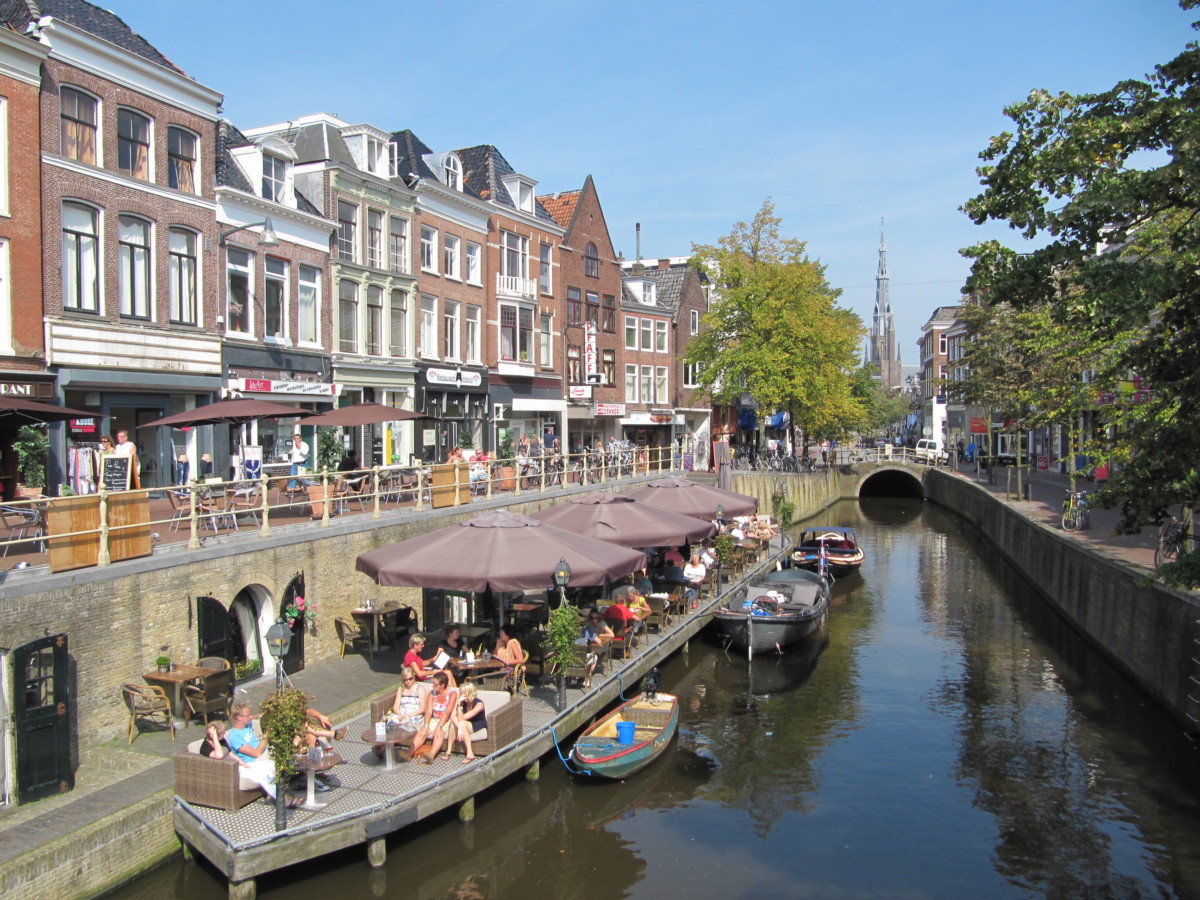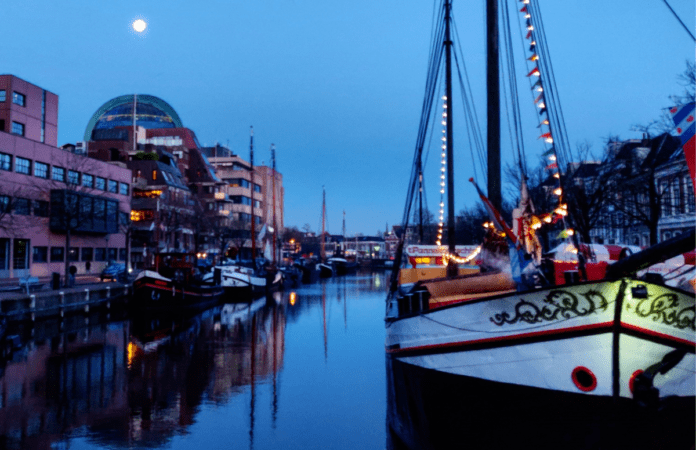Since I live in Groningen, I can’t count how many stereotypes I heard about Friesland; apparently, there is some sort of rivalry between the two northern provinces, often fueled by the occasional Frisian independentism. Hence I had this idea of the average stubborn Frisian man, speaking a weird variation of Dutch and sliding along the canals with his iceskates, claiming that Fryslân boppe en de rest yn’e groppe (kind of “Friesland über alles”).
My first shock encounter with the Frisian language happened in the train to Leeuwarden, where I didn’t realize the name of the stops were pronounced in Frisian first – I just assumed my Dutch was still very bad since I did not recognize the cities from the pronunciation.
Then I started hanging out in Leeuwarden, and I dared to say “Hey, Friesland isn’t bad as they say! And I even get some Frisian words”, but BAM! More distinctions being made between Leeuwarden and the rest of the Friesland, while I was already having a hard time distinguishing the different accents and languages (yes, Frysk is different language) in the North, nevermind one city from another. So what’s the matter with Friesland? And what is there to do in Leeuwarden, Cultural Capital of Europe in 2018?
Friesland – Cultural identity
If you want to understand Friesland and its capital, you gotta get to know its history and identity!
Friesland has historically strived for freedom; while feudal lords ruled over most of Europe in the Middle Ages, no aristocratic structures emerged in Frisia. This ‘freedom’ was represented abroad by redjeven, elected among the wealthier farmers or representatives of the autonomous rural municipalities.
During the late 19th and early 20th century, ‘Frisian freedom’ became the slogan of a regionalist movement in Friesland, demanding equal rights for the Frisian language and culture within the Netherlands. The Fryske Nasjonale Partij (FNP) has become popular over the years in the local government elections; initially the FNP aimed for independence, but in recent years they have stepped away from chasing that dream actively and became more a sort of fighters against the slow decay of the Frisian culture and identity. It calls for greater autonomy of the region, government use, protection and recognition of the Frisian language and Frisian control over its gas reserves.
So do Frisians consider themselves separate from the Dutch? Some more than others considers themselves culturally separate from the Dutch, and in all fairness if you are raised in Friesland there is a strong passionate feeling towards the Frisian history, identity and culture.
Leeuwarden identity
Leeuwarden (or Liwwadden, or Ljouwert, depending on the language/accent – see what the problem is…) is quite an old city, dating back to the 10th century. Since at the time the Middelzee was still present, the city gained an important role in the maritime trade; however, when the river became clogged with silt in the 15th century, the trade dropped off dramatically. The city saw a golden era in the 16th century, when it became the residence of Nassau, governor of the northern provinces.
Since the capital of the province is always some kind of “big city”, with many people from different provinces or even countries, it is a bit hard to find the same strong Frisian cultural identity in Leeuwarden; not as many people talk or understand Frysk, and the “Frisian pride” is not as strongly felt. But there is definitely a Leeuwarden pride, as there is a Leeuwarden accent (Liwwadden is its name in Stadsfries, or City Frisian).
In contrast to university cities such as Groningen, the percentage of students in the city’s population is not so high; you will notice that, walking around the city, you’ll see many more middle-aged/elderly people. This is actually something nice to see, as the identity of the city is much more maintained when all the generations are present.
To see and do in Leeuwarden
Historical city center
The binnenstad (downtown) is definitely nice to see and explore with all its small shops and restaurants. Also worth a look are:
- the Stadhouderlijk Hof, former residence of the royal family, and its garden.
- The Oldehove, unfinished, tilted church tower; built to compete with the Martinitower in Groningen, it definitely didn’t win the race, although its resemblance to the tilted Pisa tower (and the view from the top!) made it famous.
- The Fries museum, with a very good permanent collection and interesting temporary ones – right now, there is an intriguing exhibition about the famous Dutch actress and spy Mata Hari, born in Leeuwarden.
- The cute stadspark Prinsentuin, hosting a variety of festivals over the year.
Also, check out the ceramic tiles on the exterior wall of the Princessehof Ceramics Museum. The design is based on a piece from M.C. Escher (“Regular Division of the Plane With Birds”), commemorating the artist born in Leeuwarden.

In the surroundings
- the Blokhuispoort, an impressive former prison now being renovated to house restaurants, art galleries, shops and startups.
- De Groene Ster: located approximately 20 minutes to the east of Leeuwarden, a nature park and recreational area. Constructed in the 1960s, the park covers over 1000 hectares and is hugely popular as a location to enjoy outdoor activities. You can also find the aqua zoo, several campsites and a golf course.
Festivals and nightlife
In the upcoming months several events are happening in the city chosen as Cultural Capital of Europe for 2018 – check the program here.
Leeuwarden also hosts a range of (not only) musical festivals, among which:
- Welcome to the Village, a village within the city organized by a large group of young freelancers and more than five hundred volunteers. Food, design, music and innovation are the focus of this event.
- Psy-Fi, one of the biggest Psy-Trance festivals in Europe.
- CityRock, a music festival that celebrates rock in the broadest sense of the word: from classic rock, to bluesrock and metal.
Another location you might want to check for your nightlife is the Neushoorn, a ‘creative hub’ with two concert halls, a café, rehearsal rooms, audiovisual studios, dance studios, rooms for educational purposes and office spaces. Check their rich program here.
Eat in Leeuwarden
As you can imagine, there’s a huge amount of restaurants in Leeuwarden. Here my top 3:
- Sin Jah, a pan-asian restaurant with an elegant atmosphere and the best sushi in Leeuwarden;
- Jamuna, an indian restaurant in the heart of the city;
- ‘t Pannekoekenschip, because as any respectable Dutch city of course there’s a pancake ship!

Do you have other suggestions for things to see and do in Leeuwarden? Write in the comments section!

Another tip on what to do in Leeuwarden! Join the Free Walking Tours! There is also one in English! every Saturday at 12 PM! It’s the best introduction to the city! Have a look at: https://www.aguidetoleeuwarden.nl